2. Bar Plot
[1]:
%matplotlib inline
import matplotlib.pyplot as plt
plt.style.use('seaborn')
2.1. Basic
[2]:
import numpy as np
import pandas as pd
np.random.seed(37)
s = pd.Series(np.random.randint(0, 11, size=10))
fig, ax = plt.subplots(figsize=(10, 3))
_ = s.plot(kind='bar', ax=ax)
_ = ax.set_title('Basic bar plot')
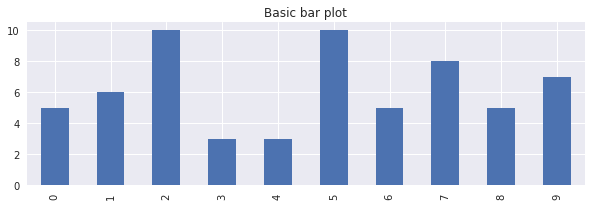
2.2. Coloring bars
Coloring bars is controlled by the color argument, which expects an array of colors.
[3]:
s = pd.Series(np.random.randint(-10, 11, size=10))
fig, ax = plt.subplots(figsize=(10, 3))
_ = s.plot(kind='bar', ax=ax, color=(s > 0).map({True: 'b', False: 'r'}))
_ = ax.set_title('Bar plot, color bars')
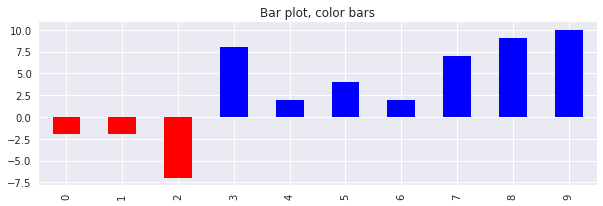
2.3. Labeling bars
Labeling or annotating bars with counts or percentage relies on access to the patches (aka rectangles) associated with each bar.
[4]:
s = pd.Series(np.random.randint(-5, 6, size=20))
fig, ax = plt.subplots(figsize=(10, 3))
_ = s.plot(kind='bar', ax=ax, color=(s > 0).map({True: 'b', False: 'r'}))
_ = ax.set_title('Bar plot, annotate bars')
for i, v in enumerate(s.values):
params = {
'x': i,
'y': v if v >= 0 else v -1.0,
's': v,
'horizontalalignment': 'center',
'verticalalignment': 'bottom',
'fontdict': {
'fontweight': 500,
'size': 12
}
}
_ = ax.text(**params)
# increase the y min and max space of the graph
y_min, y_max = ax.get_ylim()
_ = ax.set_ylim(y_min - 1.0, y_max + 1.0)
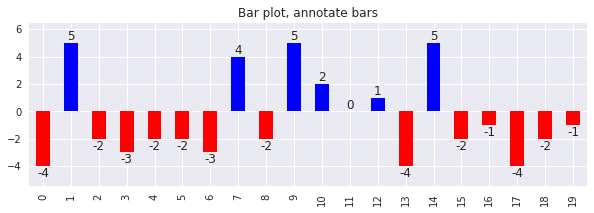
2.4. Hiding x-axis labels
Sometimes, plotting every label on the x-axis will result in collision of labels.
[6]:
s = pd.Series(np.random.randint(1, 11, size=100))
fig, ax = plt.subplots(figsize=(10, 3))
_ = s.plot(kind='bar', ax=ax)
_ = ax.set_title('Bar plot, label collision')
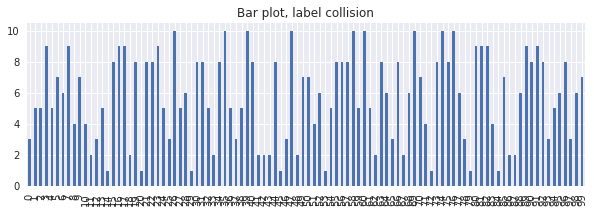
You may show only every n-th label by setting all other labels’ visibility to False.
[7]:
fig, ax = plt.subplots(figsize=(10, 3))
_ = s.plot(kind='bar', ax=ax)
_ = ax.set_title('Bar plot, show every n-th x-axis label')
n_th = 5
for index, label in enumerate(ax.xaxis.get_ticklabels()):
if index % n_th != 0:
label.set_visible(False)
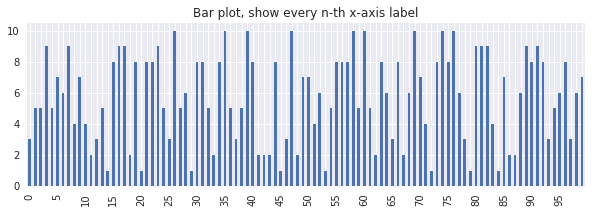
2.5. Stacked bar
[8]:
n = 25
labels = [f'y{i}' for i in range(n)]
columns = [f'x{i}' for i in range(n)]
df = pd.DataFrame(np.random.randint(0, 11, size=(n, n)), index=labels, columns=columns)
[9]:
import seaborn as sns
fig, ax = plt.subplots(figsize=(10, 3))
colors = sns.color_palette('hls', df.shape[0])
prev = []
for color, label in zip(colors, labels):
if len(prev) == 0:
ax.bar(columns, df.loc[label], color=color, label=label)
else:
s = df.loc[prev].sum()
ax.bar(columns, df.loc[label], color=color, label=label, bottom=s)
prev.append(label)
_ = ax.legend(bbox_to_anchor=(1, 1), loc='upper left', ncol=5)
_ = ax.set_title('Stacked bar')

2.6. Stacked bar, normalized
A stacked bar plot normalized to percentages is achieved through transforming the column values to percentages (the columns must sum to 1).
[10]:
fig, ax = plt.subplots(figsize=(10, 3))
colors = sns.color_palette('hls', df.shape[0])
p_df = df / df.sum()
prev = []
for color, label in zip(colors, labels):
if len(prev) == 0:
ax.bar(columns, p_df.loc[label], color=color, label=label)
else:
s = p_df.loc[prev].sum()
ax.bar(columns, p_df.loc[label], color=color, label=label, bottom=s)
prev.append(label)
_ = ax.legend(bbox_to_anchor=(1, 1), loc='upper left', ncol=5)
_ = ax.set_title('Stacked bar, normalized')

2.7. Bar, multiple series
[11]:
n = 5
m = 10
labels = [f'y{i}' for i in range(n)]
columns = [f'x{i}' for i in range(m)]
df = pd.DataFrame(np.random.randint(0, 11, size=(n, m)), index=labels, columns=columns)
[12]:
fig, ax = plt.subplots(figsize=(15, 3))
colors = sns.color_palette('hls', df.shape[0])
df.plot(kind='bar', color=colors, ax=ax)
_ = ax.legend(bbox_to_anchor=(0, -0.15), loc='upper left', ncol=5)
_ = ax.set_title('Stacked bar, series')
